Butcher block countertops are the workhouse in my kitchen. I mix, chop, roll out, knead and spill on them. Over the years I've learned a few tricks for maintaining these wood counters but the one I accidentally discovered last week is probably the best.
I'm sure you've been in this situation before. You randomly discover, invent or figure something out when you weren't even trying to. Like when you're trying to get dressed and someone knocks on the door so you quickly throw on a random sweater to answer the door and realize is looks GREAT in that mismatched, you never would have done it intentionally kind of way.
Maybe you don't have a certain ingredient to make a recipe and improvise with another substitution and it turns out better than ever. You get what I mean, right?
Sometimes ... every once in a while ... you are an accidental genius. Last week, I was an accidental genius. I'll get to that revelation in a minute.
Butcher block countertops - they might not be in the homes of everyone, but chances are everyone has a wood cutting board and if you do then this tutorial is for you too. The way you take care of wood cutting boards is the same as how you take care of butcher block counters.
If you have a completely disastrous and disgusting cutting board you should take a look at this post which describes how to get rid of the gross.
"Not very many people have those" was my mother's reaction when I told her I was writing a post on maintaining butcher block countertops. She said this while watching one of her many reality tv obsessions which includes The Bachelor (a show where people who don't know each other pretend they're going to get married one day), Say Yes to the Dress and Breaking Bad. She's kind of suspicious about the authenticity of Breaking Bad as a reality show but she likes it so she doesn't question it too much.
When I told her there are more people who have butcher block countertops than people who have successfully used a television producer as a matchmaker she just scoffed and proceeded to tell me about Tristan and Ryan for the billionth time, a lovely couple produced entirely by television who got married and are now presumably spinning off the next generation of reality show stars.
In a bold move, ignoring my mother's advice, I bring you today ...
How to Maintain Butcher Block Countertops.
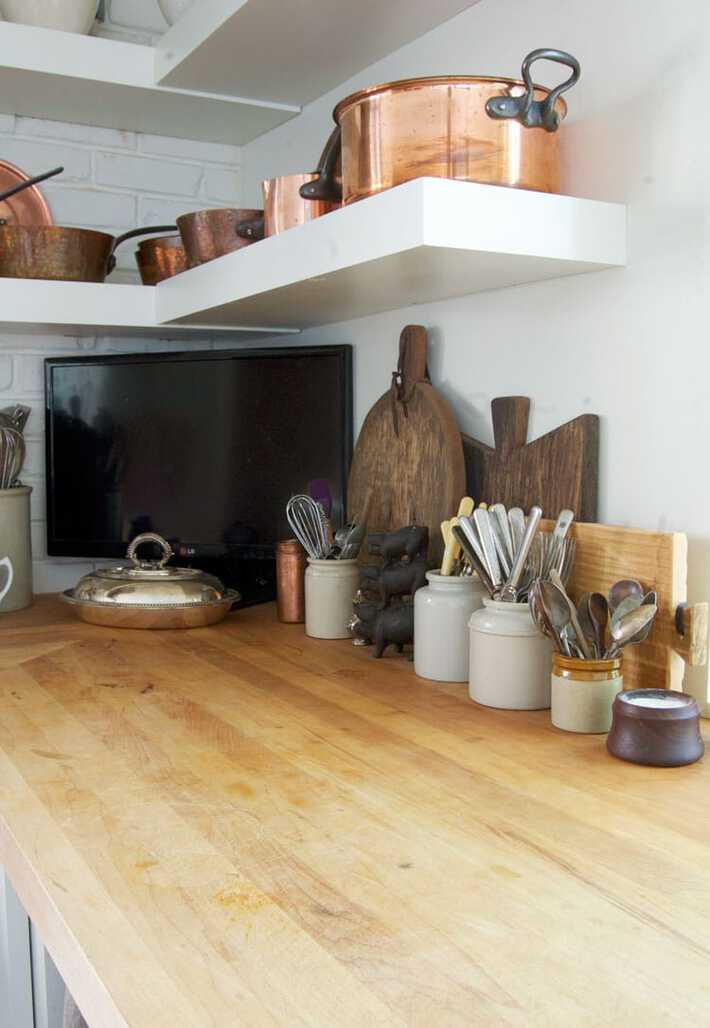
When I redid my kitchen a few years ago the one and only decision that was easy was my countertop choice. I knew I was going to have butcher block counters. Genuine, 100% maple, hard as a rock, countertops.
I also knew I wasn't going to baby them and I didn't expect them to look brand new their whole life. Unlike my copper pots which I had just cleaned before this post. I actually never clean my copper pots so this is unusual. The odd time I'll clean the inside of them if I accidentally leave something that badly stains the tin lining.
For me, butcher block countertops are a tool in my kitchen. I slop, cut, roll, mash and create on them. Wood is naturally antibacterial, self healing and NOTHING makes a better sound while chopping on it than wood. I want my counters to look used and develop a patina, but they still have to be maintained and kept in good condition.
I personally don't try to get rid of the stains on my countertops unless they're so prominent they're distracting. But for the purpose of this post, I'll show you how to get rid of butcher block stains in case you prefer your counters to have no stains.
2 FACTS YOU NEED TO KNOW
There are only 2 ways wood can go bad. Moisture getting in or moisture getting out. Maintaining any wood surface in the kitchen means you have to a) stop moisture from getting into the wood and b) stop moisture from getting out of the wood. This according to Jason Stafford of Talbot Wood, where I got my countertops made. Oiling your butcher block creates a barrier that stops both of these things. It stops moisture from seeping into the wood and stops moisture from escaping.
To stop both of those things you need to use a water barrier - oil. Mineral oil to be precise.
What is Mineral Oil?
Mineral oil is a petroleum (paraffin) product with no colour, odour or flavour. It stops water from absorbing or releasing. For treating counters you specifically need food-grade mineral oil. The easiest place to find it is in your local drugstore. Hardware stores sometimes carry it as well, but if you're buying your mineral oil at a hardware store make sure what you're getting is food-grade mineral oil.
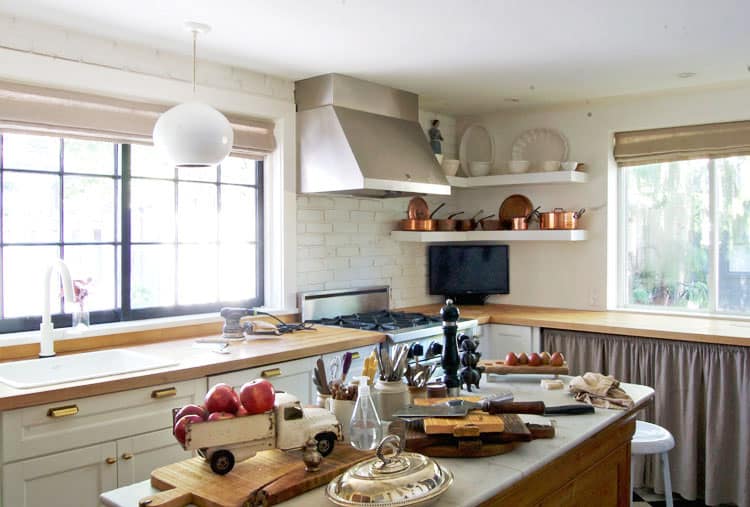
HOW TO MAINTAIN BUTCHER BLOCK COUNTERTOPS.
- Remove everything from your countertops.
- Wipe them with a damp cloth.
- Scrape the surface with a dough scraper to remove anything stuck on the surface.
- Scrape light surface stains away with a razor blade.
- Sand deeper stains with 180 then 220 grit sandpaper. (note your sanded area will lighten)
- Wipe counter clean with a cloth.
- Run your hand over the counter to make sure it's completely free of grit or guck.
- Pour mineral oil directly onto the counter and rub it around the entire surface with a lint free cloth.
- Allow the mineral oil to absorb. This could take as little as an hour or as much as overnight.
- Wipe the counters again to remove any residual oil.
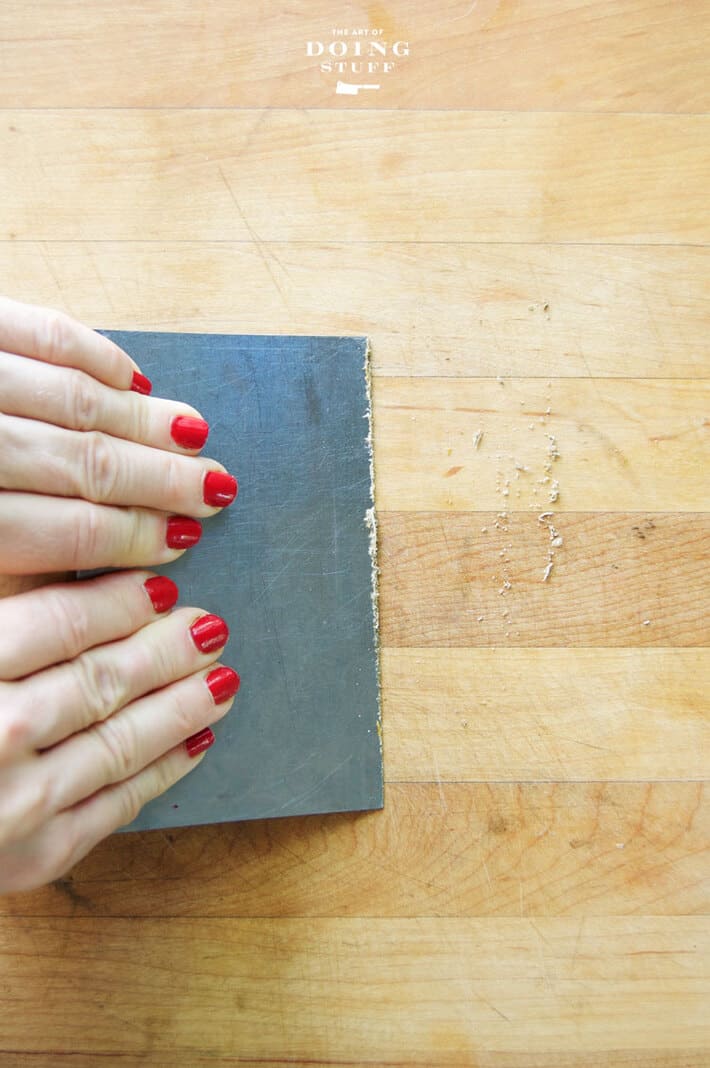
The dough scraper will get off old stuck on flour etc. that you didn't even know was on your counter.
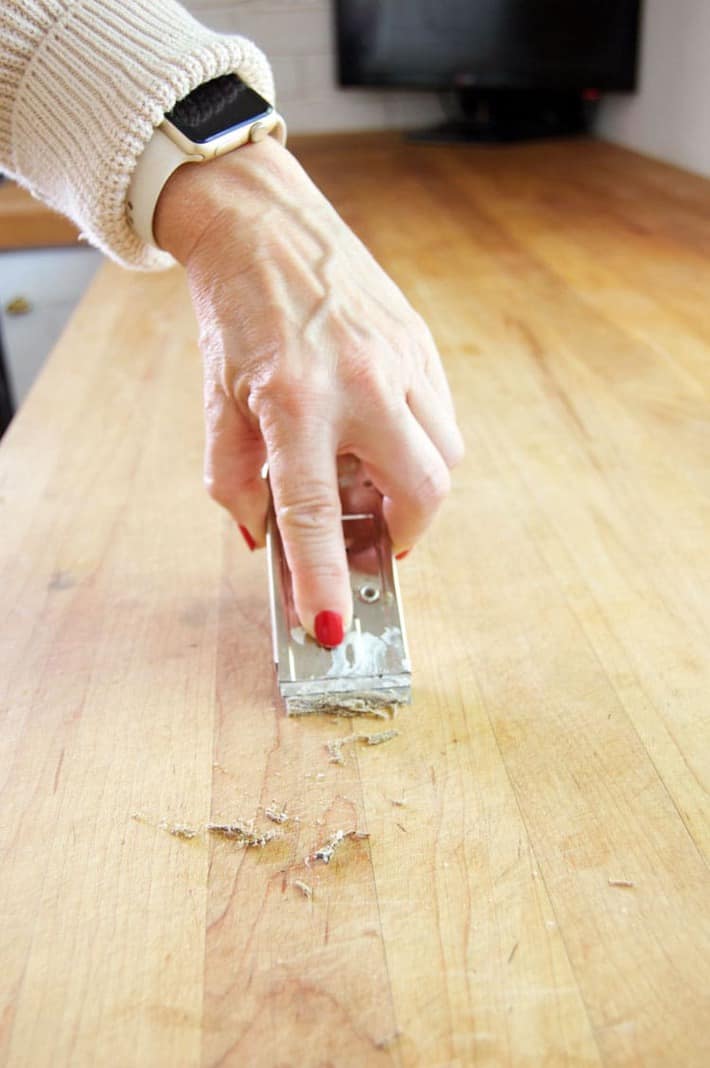
A razor blade can help remove very light surface stains with a few passes. It's scraping off the very top surface of the wood.
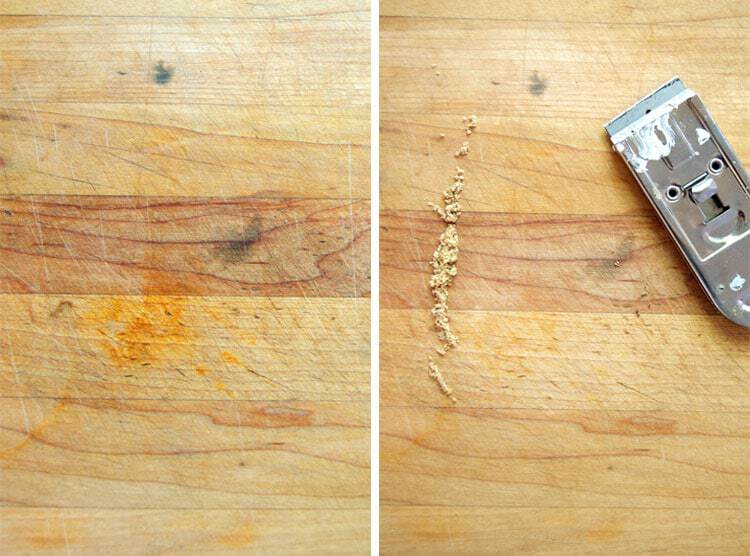
For deeper stains you'll have to use sandpaper. But know that when you sand your countertop stain away you'll also be sanding away any patina the wood has achieved. So the spot you sand will be lighter than the rest of the counter.
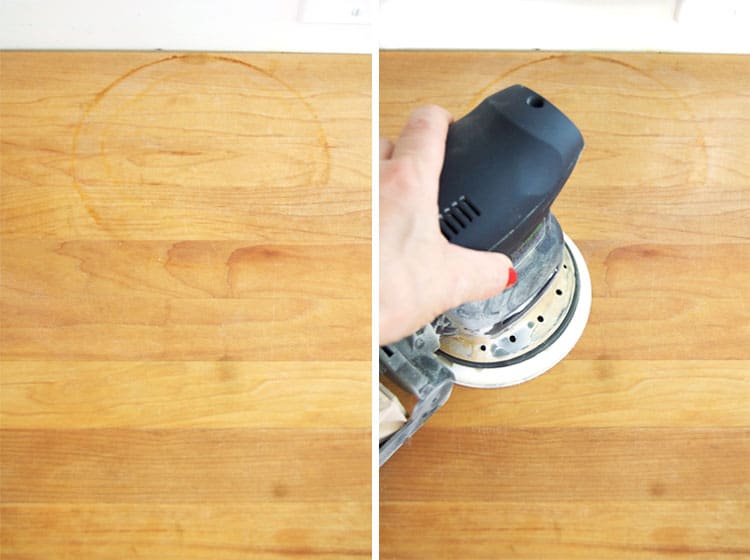
You have to decide whether you'd rather have a stain or a slightly lighter section in your counter.
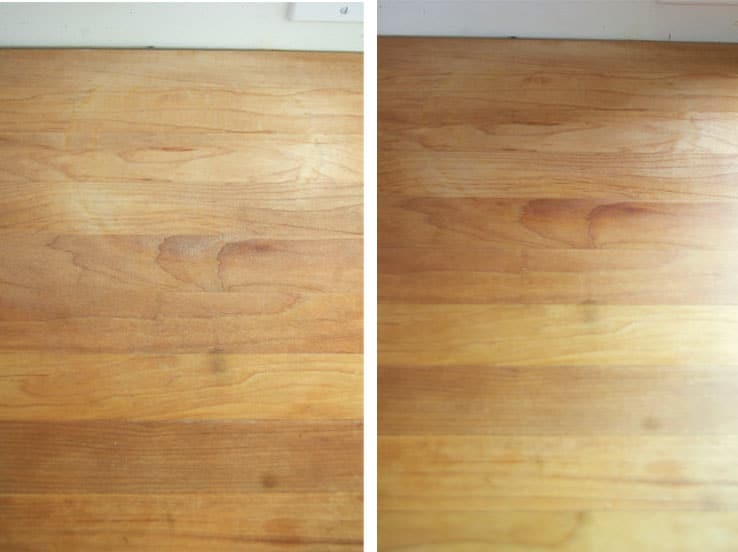
Once you oil the area the lightened wood will become much less noticeable.
You can also sand your entire countertops using coarse, medium and then fine sandpaper to completely restore them and make them look brand new again if that's what you want.
HERE'S THE PART WHERE I BECAME AN ACCIDENTAL GENIUS LAST WEEK!
I can't even remember how it happened but I used a magic eraser to erase a stain on my counter. It was something I did subconsciously for some reason but I've never done it before.
Would you like to save this stuff?
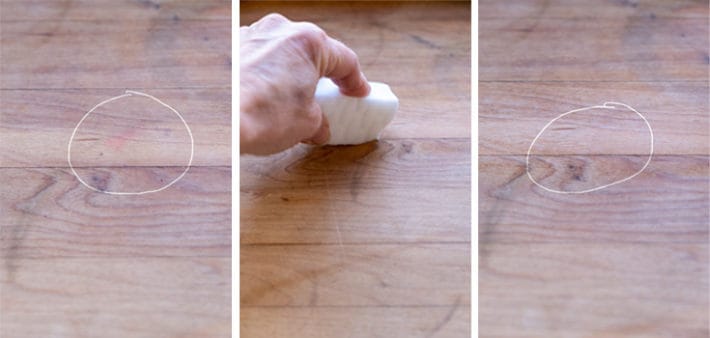
The Magic Eraser will remove surface stains. (It won't remove dark water stains that have been there forever, but things like food stains will disappear almost immediately without lightening the colour of the wood.
NO idea why I never thought to use a magic eraser on my counter before, but there you have it. There's no explaining the phenomenon of the accidental genius.
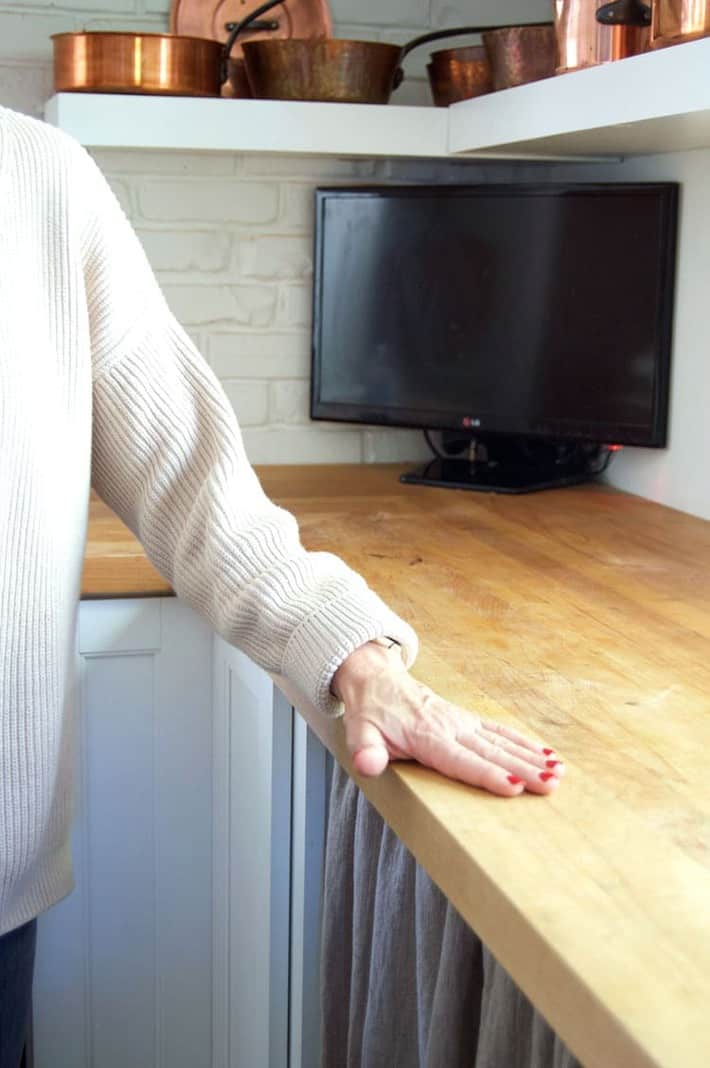
Make sure the final wipe of your counter before conditioning it with oil is with your hand. Your hand can feel any bits that a cloth leaves behind.
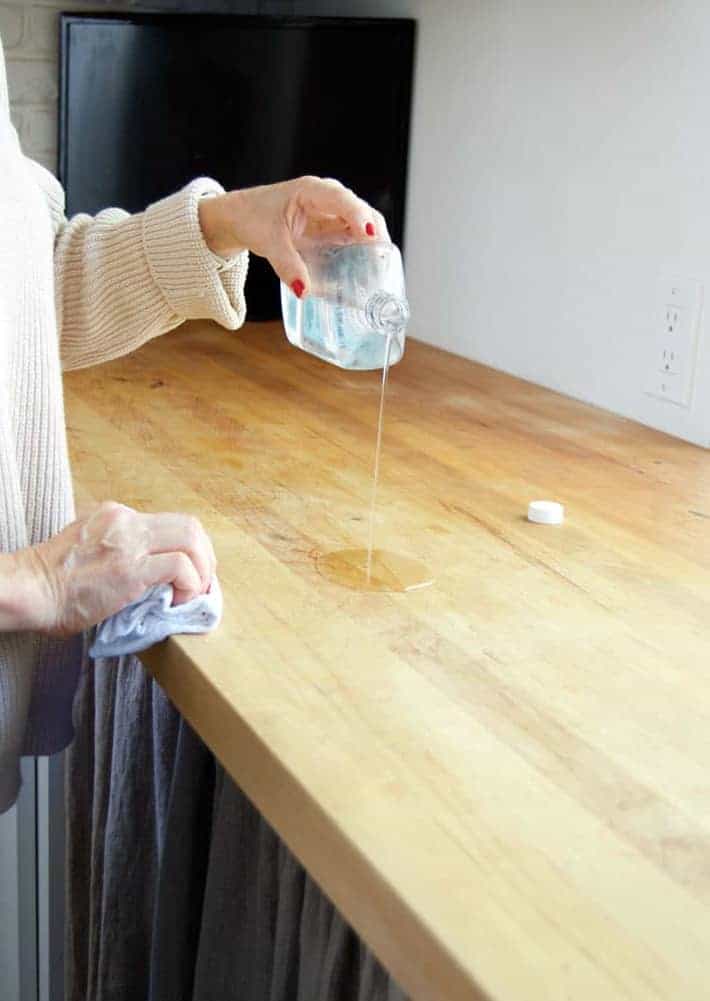
I use mineral oil to help condition the wood but you can also use board butter. A mixture of mineral oil (or hemp oil in some cases) and beeswax. You can read my post on how to easily make your own Board Butter here.
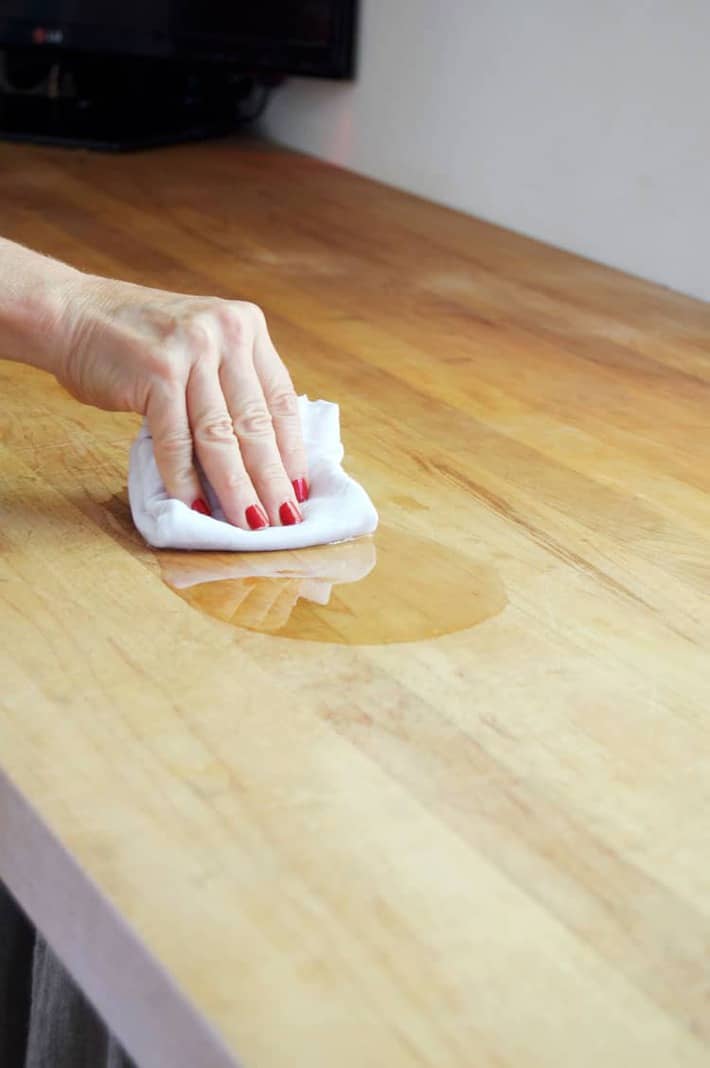
Don't be skimpy with the mineral oil. You want it to pool on the surface.
When you condition your butcher block countertops for the first time the oil will penetrate into the wood immediately because it's so dry. Just keep conditioning it for the first month until you get to the point where the mineral oil doesn't soak in anymore.
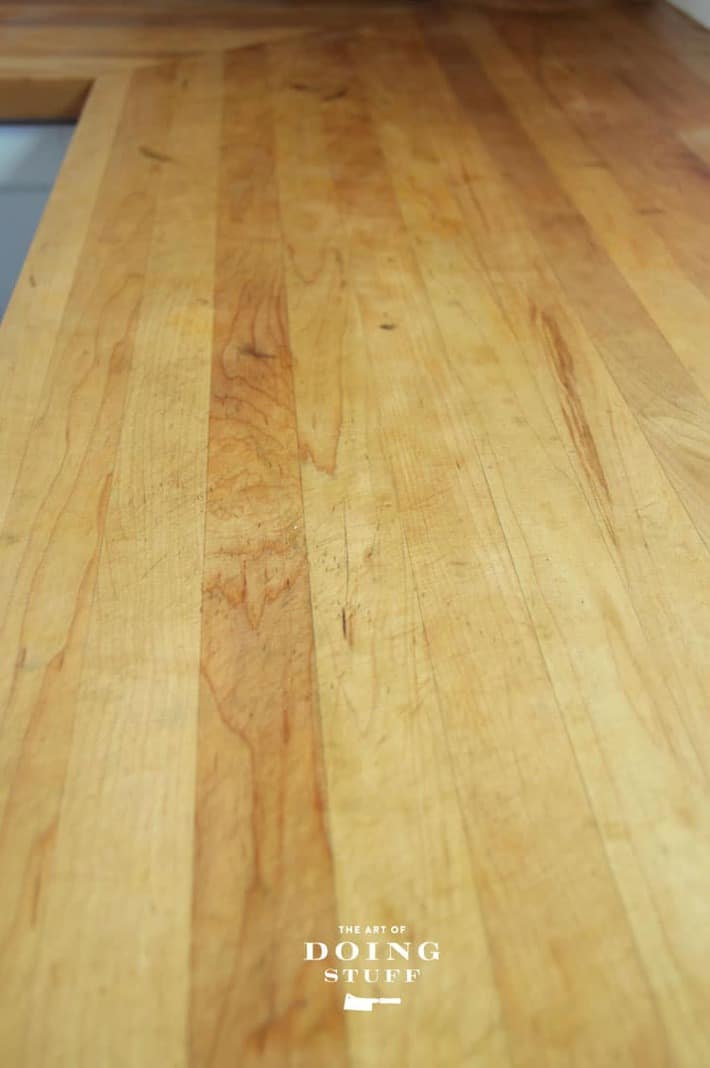
Why do you need to condition your wood countertops? Because conditioning the wood keeps it from drying out and prevents stains. Water and moisture will bead up on top of the counter instead of soaking in and staining it or even worse, warping it.
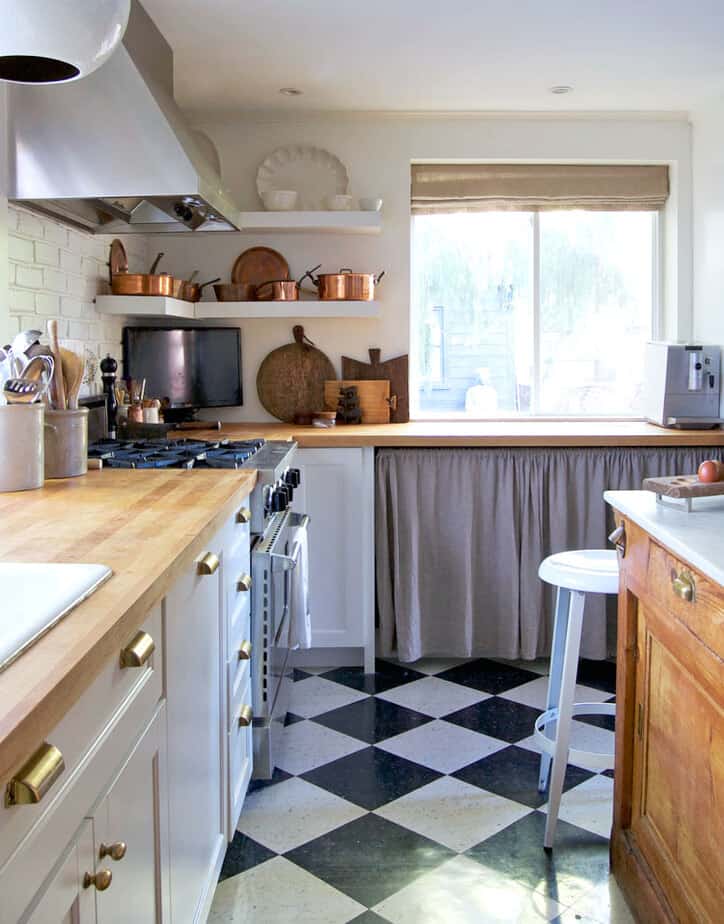
Once you've finished conditioning the counters with oil or board butter you can put everything back where it came from. Unless you're me. If you're me you'll see how great your kitchen looked with nothing on the counters and you'll only put back half of what you had out originally.
Then day by day you'll allow everything to creep back until it's just as full as it was originally with the addition of a few new things.
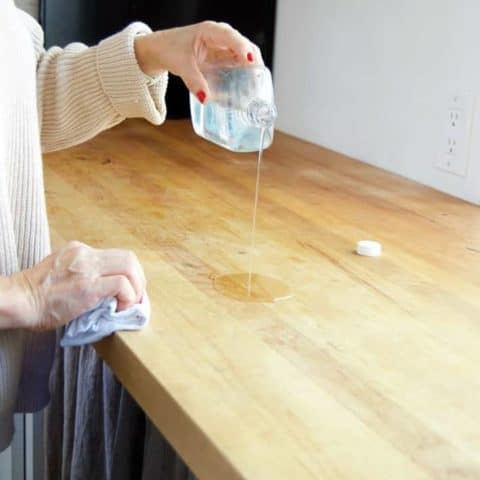
HOW TO MAINTAIN BUTCHER BLOCK COUNTERS.
How to maintain your butcher block countertop or cutting board with mineral oil, some sandpaper for stains and a dough scraper.
Materials
- Mineral oil (food grade)
- Sandpaper
Tools
- Orbital palm sander (optional)
Instructions
- Remove everything from your countertops.
- Wipe them with a damp cloth.
- Scrape the surface with a dough scraper to remove anything stuck on the surface.
- Scrape light surface stains away with a razor blade.
- Sand deeper stains with 180 then 220 grit sandpaper. (note your sanded area will lighten)
- Wipe counter clean with a cloth.
- Run your hand over the counter to make sure it's completely free of grit or guck.
- Pour mineral oil directly onto the counter and rub it around the entire surface with a lint free cloth.
- Allow the mineral oil to absorb. This could take as little as an hour or as much as overnight.
- Wipe the counters again to remove any residual oil.
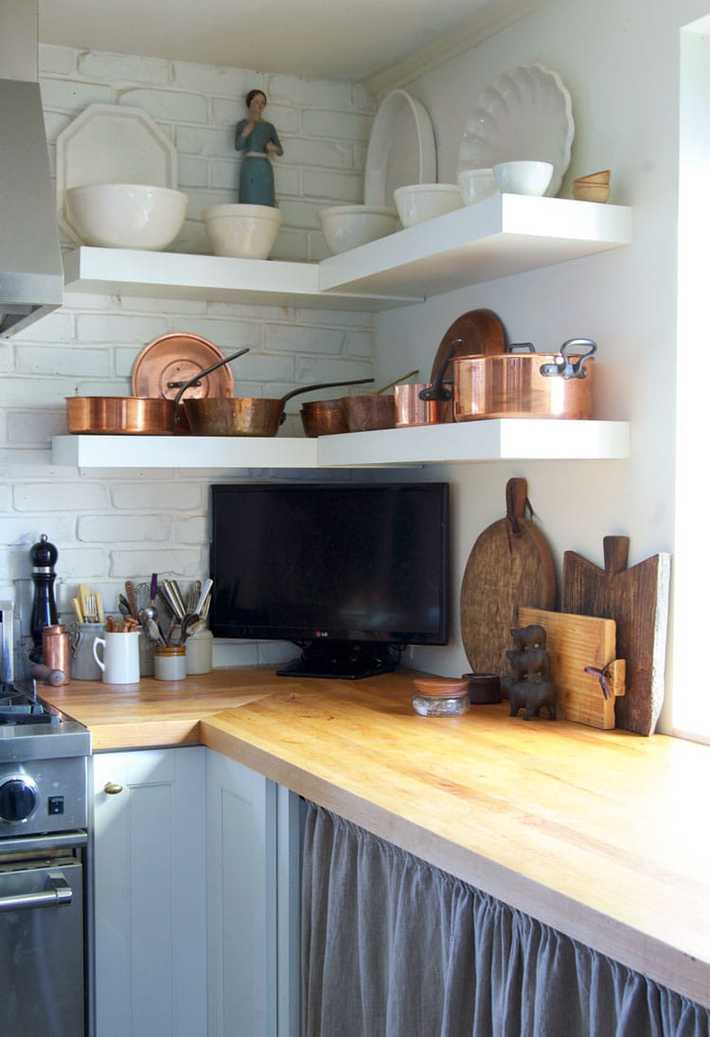
QUESTIONS & ANSWERS
How often should I oil my butcher block countertops?
That kind of depends. The age of your counter, how dried out it is, if it's winter or summer and myriad of other things dictate how often it should be oiled. BUT I would say a good general rule would be to oil your butcher block countertops once every month or two.
They will need more oiling in the winter when the air is drier and less in the summer when the air is more humid.
Can you sand your entire countertop?
Sure! If you'd like to start from scratch so to speak, you can sand the entire countertop to take off all of the top layer stains. Very deep black stains won't come out but all of them will be made less noticeable. To rejuvenate your entire butcher block countertop sand with coarse, medium and then fine grit sandpaper using an orbital sander.
I don't use paraffin products. What other kind of oil can I use to maintain my counters?
You can try a refined coconut oil (not the regular stuff you grab in the grocery store) which has been distilled and won't go rancid. You can also use Tung oil, but it could bring out a gold colour in your wood and because it's made from nuts shouldn't be used where anyone with nut allergies come into contact with it.
Do I need to do this more than once?
Yep. You'll need to maintain the counter regularly. ALSO you'll need to give several coats of mineral oil the first time you do this or when the counter is realllyyyyy dry. If it soaks up all the oil almost immediately you know you'll need another coat of oil. Just let it soak in for a few hours and then do it again. When it finally seems to stop soaking into the wood quickly, you can stop.
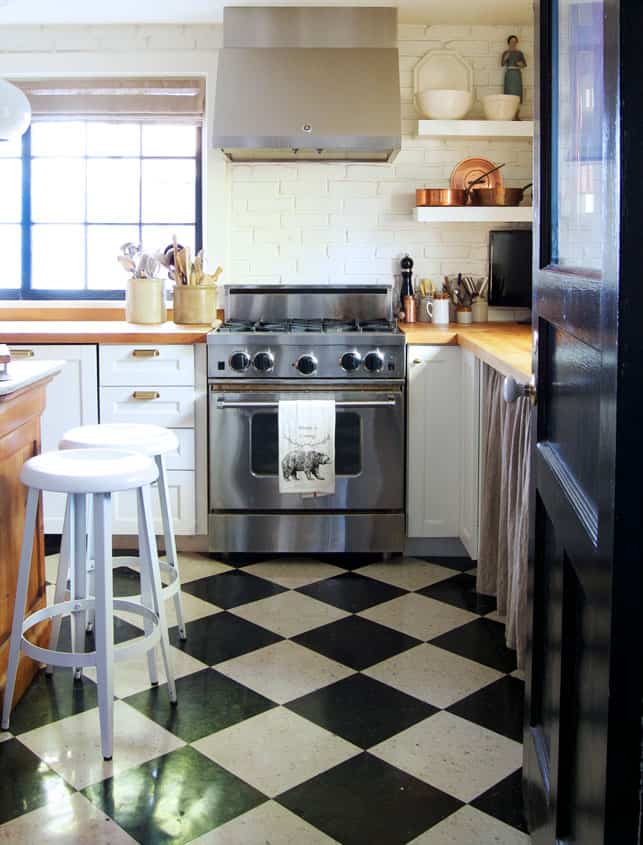
Which is about how often I hear about those lovebirds Tristan and Ryan by the way.
→Follow me on Instagram where I often make a fool of myself←
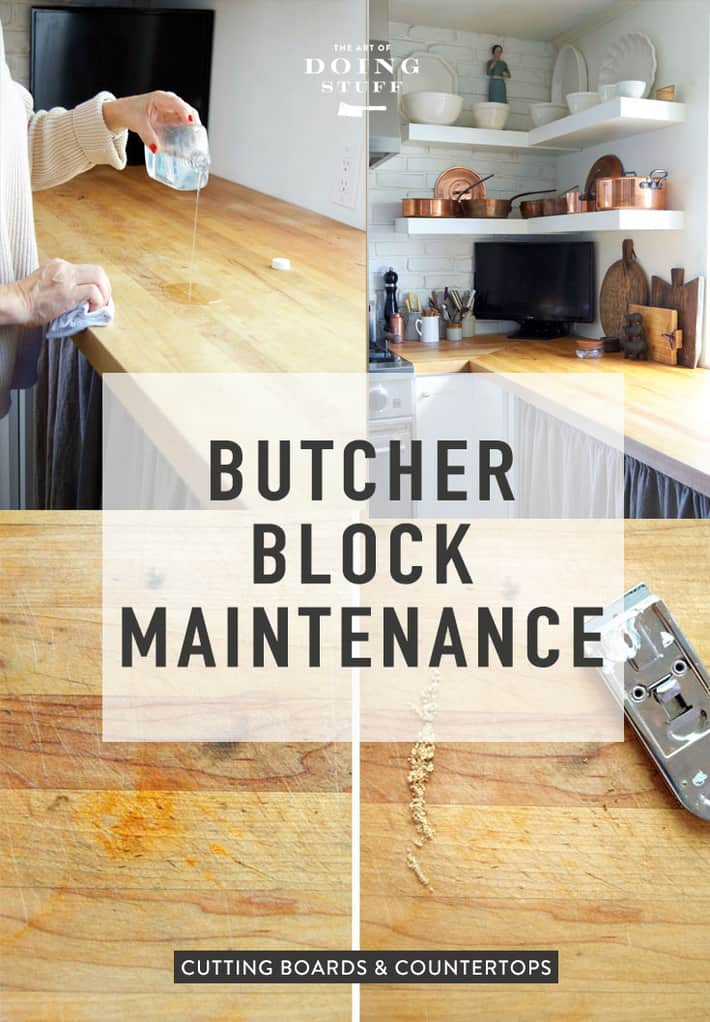

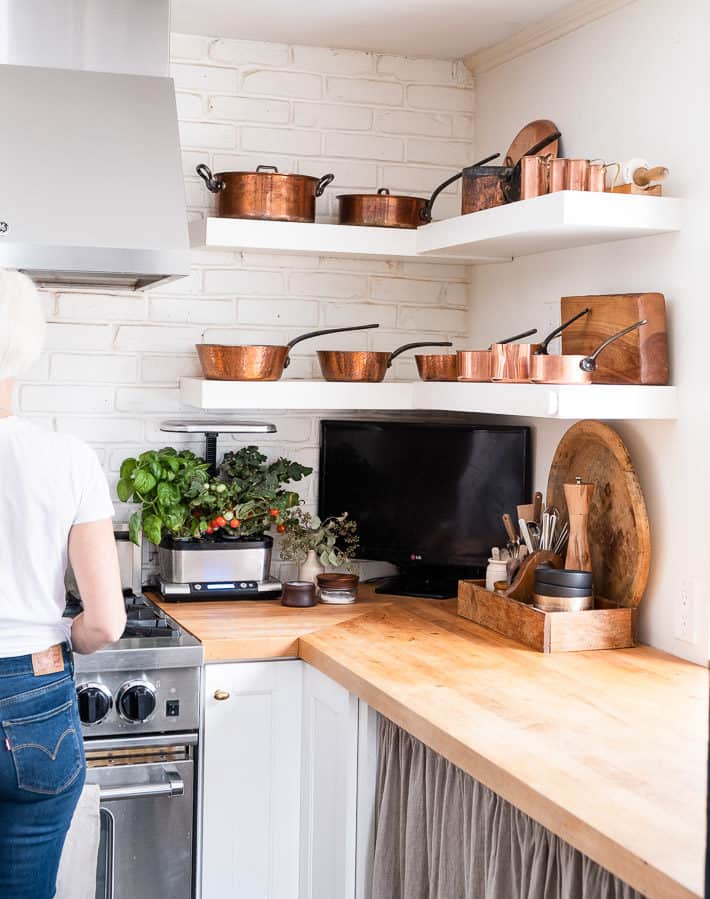

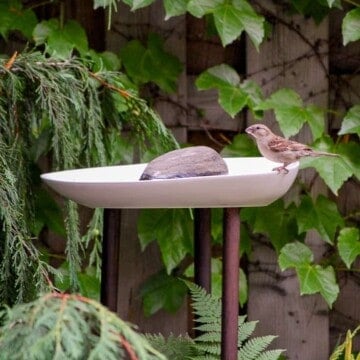
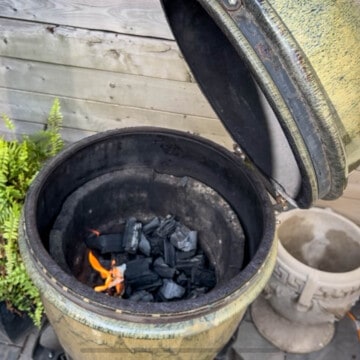

Suzanne
A cut lemon placed on a stain, especially a colored stain, will bleach stain away in a couple of hours/overnight. No harm to the wood.
tuffy
LOVE this very useful post!!
Thank you!!
I have a ton of wood cutting boards and they all crack, leaving me with leaking spots in certain se rooms if all my boards :(
Now I know how to prevent this!!
Thank you!
If you know if a DIY way to fix cracked cutting boards, I’d love to know that too!!
Holly
Great post! So helpful. Thank you.